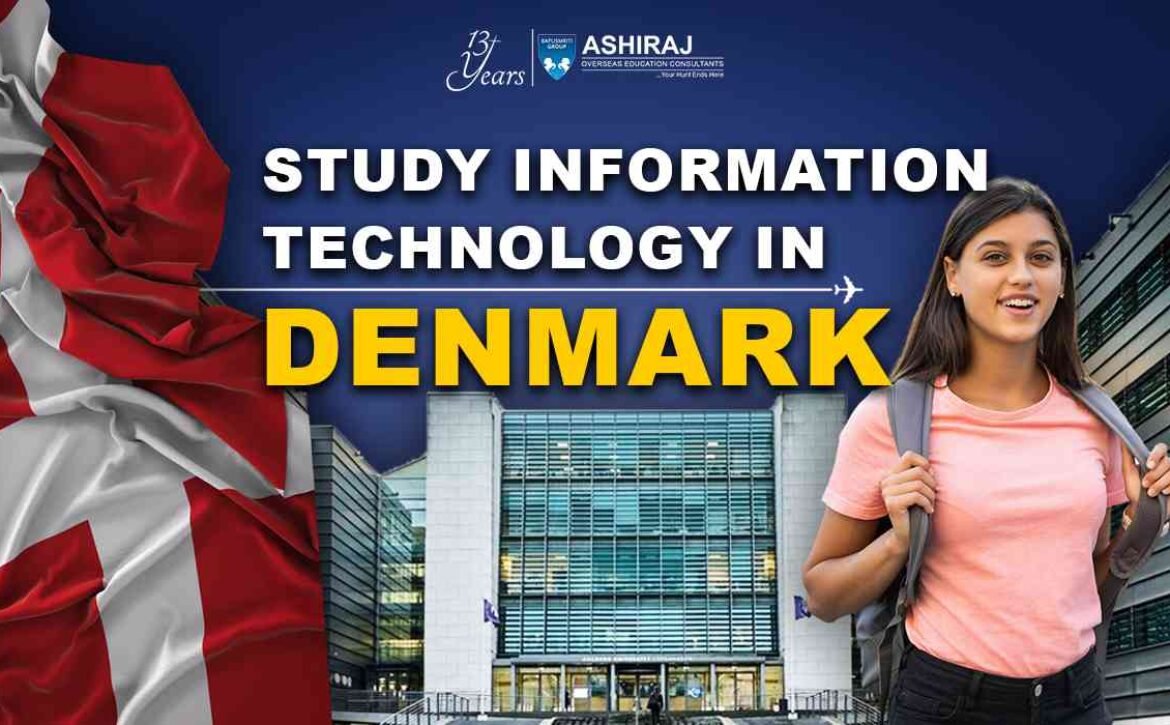
Information Technology in Denmark
Information technology in Denmark has emerged as a pivotal force driving innovation and efficiency across various sectors. With a robust infrastructure and a tech-savvy population, Denmark stands at the forefront of IT advancements in Scandinavia. From Copenhagen’s bustling startup scene to established multinational corporations, the country fosters a dynamic ecosystem for IT development and implementation.
Denmark’s emphasis on digitalization is evident in its government policies and investments in cutting-edge technologies. The nation consistently ranks high in global indices for digital readiness and connectivity, showcasing its commitment to harnessing the power of information technology for economic growth and societal progress. As Information technology in Denmark continues to evolve, its impact resonates not only locally but also on the international stage, shaping industries and driving innovation forward.
Why to Study Information Technology in Denmark?
- Cutting-Edge Curriculum: Denmark offers state-of-the-art IT programs at its universities and colleges, providing students with up-to-date knowledge and skills relevant to the rapidly evolving field of technology.
- Internationally Recognized Degrees: Degrees obtained from Danish institutions are highly respected worldwide, offering graduates excellent prospects for employment both within Denmark and internationally.
- Innovation Hub: Denmark’s vibrant tech ecosystem, especially in cities like Copenhagen, provides ample opportunities for students to engage with industry professionals, startups, and multinational corporations, fostering innovation and collaboration.
- English-Taught Programs: Many IT programs in Denmark are taught entirely in English, making them accessible to international students and eliminating language barriers.
- Strong Support for Research: Denmark prioritizes research and development in the IT sector, offering students opportunities to participate in groundbreaking research projects and gain valuable hands-on experience.
- High Quality of Life: Denmark consistently ranks among the top countries for quality of life, offering students a safe, inclusive, and environmentally conscious environment to live and study.
- Access to Cutting-Edge Technology: Students studying IT in Denmark have access to state-of-the-art facilities and resources, enabling them to gain practical experience with the latest technologies and tools.
- Global Networking Opportunities: Studying IT in Denmark exposes students to a diverse and international student community, providing valuable networking opportunities that can extend beyond graduation.
By studying Information Technology in Denmark, students can benefit from a world-class education, access to innovative technology, and a supportive environment conducive to personal and professional growth.
Top Universities to Study Information Technology in Denmark
University | QS World University Ranking 2023 | Type of University | Average Annual Fees | Programs Offered |
Technical University of Copenhagen | 50 | Public | DKK 0 – DKK 30,000 | Computer Science, IT Engineering, Data Science |
University of Aarhus | 65 | Public | DKK 0 – DKK 30,000 | Computer Science, Information Technology, Software Engineering |
Aalborg University | 90 | Public | DKK 0 – DKK 30,000 | Computer Science, IT and Business, Software Engineering |
IT University of Copenhagen | 120 | Public | DKK 0 – DKK 30,000 | Software Development, Digital Design and Communication, Data Science |
University of Southern Denmark | 150 | Public | DKK 0 – DKK 30,000 | Computer Science, IT and Economics, Software Engineering |
Denmark hosts several prestigious universities renowned for their excellence in Information technology education. These institutions offer a diverse range of programs, from computer science to software engineering, providing students with comprehensive knowledge and skills essential for thriving in the IT industry. With affordable tuition fees and a strong emphasis on research and innovation, these universities attract students from around the globe seeking top-quality education in Information technology in Denmark.
Course Curriculum for Information Technology in Denmark
- Cutting-Edge Courses: Information technology programs in Denmark feature cutting-edge courses designed to equip students with the latest knowledge and skills in the field.
- Focus on Practical Skills: The curriculum emphasizes hands-on learning experiences, allowing students to apply theoretical concepts to real-world IT challenges.
- Interdisciplinary Approach: Many programs incorporate elements from related fields such as computer science, engineering, and data science, providing students with a well-rounded education.
- Industry-Relevant Projects: Students often engage in industry collaborations and internships, gaining valuable experience and building professional networks.
- Specialization Options: Students can choose from a variety of specialization tracks, including software development, cybersecurity, artificial intelligence, and more, to tailor their education to their career goals.
- Research Opportunities: Denmark’s universities offer ample opportunities for students to participate in research projects, contributing to advancements in Information technology.
- International Perspective: With a diverse student body and faculty, Information technology programs in Denmark offer an international perspective, preparing students for global careers in IT.
- Continuous Adaptation: The curriculum is regularly updated to reflect the rapidly changing landscape of Information technology, ensuring graduates are well-prepared for the demands of the industry.
Eligibility Criteria & Admission Requirements for MS in Information Technology in Denmark
- Language Proficiency: Applicants must demonstrate proficiency in English by providing either IELTS or TOEFL scores. For IELTS, a minimum score of 6.5 is required, while for TOEFL, a score of at least 80 is necessary.
- Standardized Tests: Candidates may need to submit scores from either GRE or GMAT exams. For GRE, a competitive score is typically above 310, while for GMAT, a score of around 600 is desirable.
- Educational Background: Applicants should hold a bachelor’s degree in a relevant field such as computer science, engineering, or information technology. A minimum GPA requirement may apply.
- Passport & Student Visa: International students must possess a valid passport and obtain a student visa to study in Denmark. Visa application procedures vary by country, and students should consult the Danish embassy or consulate in their home country for specific requirements.
- Academic Certificates: Applicants are required to submit transcripts and certificates from previous academic institutions, demonstrating their academic achievements and qualifications.
- Work Experience: While not always mandatory, some programs may prefer candidates with relevant work experience in the IT field, particularly for advanced or specialized programs.
Table of Required Scores:
Test | Minimum Score |
IELTS | 6.5 |
TOEFL | 80 |
GRE | 310 |
GMAT | 600 |
Meeting these eligibility criteria ensures that candidates have the necessary language proficiency, academic background, and standardized test scores to succeed in Information technology in Denmark.
Documents Required for Studying Information Technology in Denmark
- Passport: A valid passport is essential for international students applying to study Information technology in Denmark.
- Two Letters of Recommendation (LOR): Applicants typically need to submit LORs from academic or professional references attesting to their qualifications and character.
- Statement of Purpose (SOP): An SOP outlines the applicant’s academic and career goals, reasons for choosing the program, and how it aligns with their aspirations in Information technology in Denmark.
- Curriculum Vitae (CV): A comprehensive CV detailing the applicant’s educational background, work experience, skills, and achievements is required.
- Official High School Transcripts: Transcripts from high school or secondary education institutions demonstrating academic performance are necessary.
- Educational Certificates: Applicants must provide copies of their educational certificates, including diplomas or degrees earned.
- Work Experience Certificate: If applicable, a certificate verifying previous work experience in the IT field should be submitted.
- Proof of Financial Resources: Applicants need to demonstrate sufficient financial resources to cover tuition fees, living expenses, and other costs associated with studying Information technology in Denmark.
Ensuring all these documents are complete and submitted accurately is crucial for a successful application to Information technology programs in Denmark.
Admission Process for Information Technology in Denmark
- Research Programs: Explore Information technology programs offered by universities in Denmark and identify the ones that align with your academic and career goals.
- Check Eligibility: Review the admission requirements, including language proficiency tests (IELTS or TOEFL) and standardized tests (GRE or GMAT), ensuring you meet the criteria.
- Gather Documents: Collect necessary documents such as transcripts, certificates, passport, letters of recommendation (LOR), statement of purpose (SOP), curriculum vitae (CV), and proof of financial resources.
- Prepare Application: Complete the online application form provided by the university, ensuring all information is accurate and all required documents are uploaded.
- Submit Application: Submit your application before the specified deadline. Some universities may charge an application fee.
- Wait for Response: Wait for the university to review your application. This process may take several weeks, so be patient.
- Interview (if required): Some programs may require an interview as part of the admission process. Prepare adequately if you are invited for an interview.
- Receive Admission Decision: Once the university has reviewed your application, you will receive an admission decision. If accepted, you will receive an offer letter.
- Accept Offer and Secure Visa: Accept the offer of admission and proceed to secure a student visa for Denmark. Follow the instructions provided by the university and Danish authorities.
- Prepare for Arrival: Make necessary arrangements for accommodation, travel, and any other logistics before traveling to Denmark to commence your Information technology studies.
Following these steps diligently will ensure a smooth admission process to pursue Information technology in Denmark.
“Education is the most powerful weapon which you can use to change the world.”
Nelson Mandela
Cost of Information Technology Course in Denmark
- Tuition Fees: Most universities in Denmark offer tuition-free education for EU/EEA and Swiss citizens. However, international students from other countries may incur tuition fees ranging from DKK 0 to DKK 120,000 per year, depending on the institution and program.
- Living Expenses: Living costs in Denmark can vary depending on factors such as location and lifestyle. On average, international students should budget around DKK 6,000 to DKK 10,000 per month for accommodation, food, transportation, and other expenses.
- Health Insurance: International students are required to have health insurance while studying in Denmark. The cost of health insurance varies but is typically around DKK 1,000 to DKK 2,000 per year.
- Additional Expenses: Additional expenses may include study materials, transportation, leisure activities, and travel within Denmark or Europe.
- Scholarships and Financial Aid: Some universities and organizations offer scholarships and financial aid to help offset the cost of studying Information technology in Denmark for international students.
Understanding the cost of studying in Denmark is essential for planning and budgeting effectively. By considering tuition fees, living expenses, health insurance, and potential financial aid options, students can make informed decisions about their education in Information technology in Denmark.
Scholarships for Information Technology Courses in Denmark
Scholarship Name | Amount | Application Deadline |
Danish Government Scholarships | Full tuition fees + monthly stipend | Varies (typically early in the year) |
Danish State Educational Support (SU) | Up to DKK 6,815 per month | No specific deadline; apply upon arrival in Denmark |
Erasmus+ Scholarships | Varies depending on program | Varies by program |
University-specific Scholarships | Varies by university | Varies by university |
Danish International Scholarship | Up to DKK 5,000 per month | Varies (check individual university websites) |
Information technology in Denmark offers various scholarship opportunities to support international students pursuing their studies. These scholarships cover full or partial tuition fees, living expenses, and other related costs. Students need to check the eligibility criteria and application deadlines for each scholarship opportunity and submit their applications accordingly. By taking advantage of these scholarships, students can alleviate the financial burden of studying Information technology in Denmark and focus on their academic and professional development.
Career Opportunities After Information Technology in Denmark
Job Profile | Average Salary (DKK per year) |
Software Developer | 450,000 – 700,000 |
Data Analyst | 500,000 – 800,000 |
IT Consultant | 550,000 – 850,000 |
Cybersecurity Analyst | 600,000 – 900,000 |
Network Engineer | 500,000 – 750,000 |
Information technology in Denmark offers a plethora of career opportunities for skilled professionals. From software development to cybersecurity, there is a high demand for IT talent across various sectors. Software developers, data analysts, and IT consultants are among the most sought-after professionals, with salaries ranging from 450,000 to 850,000 DKK per year. Cybersecurity analysts and network engineers also command competitive salaries, ranging from 500,000 to 900,000 DKK per year. With a strong emphasis on innovation and digitalization, Denmark provides an excellent environment for IT professionals to thrive and advance their careers. Whether working for multinational corporations, startups, or government agencies, IT professionals in Denmark can expect rewarding career prospects and opportunities for growth.
Frequently Asked Questions About Information Technology in Denmark
Some of the top universities in Denmark offering Information Technology programs include the Technical University of Copenhagen, University of Aarhus, and Aalborg University.
Yes, there are scholarships available for international students studying Information Technology in Denmark, including Danish Government Scholarships, Erasmus+ Scholarships, and university-specific scholarships.
Admission requirements typically include proof of language proficiency (IELTS or TOEFL), academic transcripts, letters of recommendation, and a statement of purpose.
Tuition fees for Information Technology programs in Denmark vary depending on the institution and program. International students may also need to budget for living expenses, health insurance, and other costs.
Graduates of Information Technology programs in Denmark can pursue various career opportunities, including software development, data analysis, IT consulting, cybersecurity, and network engineering.
Yes, international students in Denmark are allowed to work part-time while studying, typically up to 20 hours per week during the academic year and full-time during holidays.
The average salary for Information Technology professionals in Denmark varies depending on the job role and level of experience but generally ranges from 450,000 to 900,000 DKK per year.
The duration of Information Technology programs in Denmark varies depending on the level of study. Bachelor’s programs typically take three to four years to complete, while master’s programs usually take one to two years.
Yes, international students who have completed a degree in Denmark may be eligible to apply for a post-study work permit, allowing them to work in Denmark for up to two years after graduation.
International students studying Information Technology in Denmark can access various support services, including academic advising, career counseling, language courses, and assistance with accommodation and visa applications.




